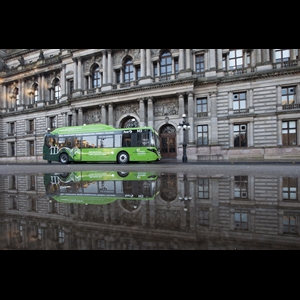 First Bus is delighted to have been awarded over £4m as part of Transport Scotland’s new funding programme, the Scottish Ultra Low Emission Bus scheme (SULEB), which will help pay some of the costs of purchasing 22 new fully electric buses for the Glasgow bus network.
First Bus is delighted to have been awarded over £4m as part of Transport Scotland’s new funding programme, the Scottish Ultra Low Emission Bus scheme (SULEB), which will help pay some of the costs of purchasing 22 new fully electric buses for the Glasgow bus network.
The new buses will be made by Alexander Dennis Ltd at their Scottish base in Falkirk providing a massive boost for the sector and helping to secure jobs in the local area. First Glasgow are also investing over £5m alongside this funding to help bring this project to life.
Scottish Power Energy Networks will also be providing over £300k in contribution to the project from their Green Economy Fund which will go toward the electrical infrastructure needed to charge the vehicles at First Glasgow’s Caledonia Depot.
Both the 22 new fully electric vehicles as well as the relevant infrastructure will be completed at our Caledonia depot and in place ready to go on the Glasgow network by autumn 2021 in time for the city hosting COP26, the UN Climate Change Conference.
Over £3m of funding through Transport Scotland’s latest round of BEAR funding will also help transform some of the oldest buses in the fleet into low emission vehicles. The grant allows operators to upgrade the exhaust systems on mid-life vehicles to achieve a significantly lower emissions output.
165 buses will have their exhaust systems changed to meet the current Euro VI standard – the cleanest diesel engines currently available – which will significantly improve emissions of Nitrogen Oxide (NOX) and fine particulate matter (PM2) across its Glasgow network.
In the past year, First Glasgow have already reached a significant milestone with more than 40% of vehicles being Euro VI standard or better and the retrofit programme along with the 22 pure electric vehicles will further enhance the Glasgow City Council LEZ compliance plan, with over 60% of the vehicles reaching Euro VI standard once the 187-vehicle projects are completed.
First Bus is focused on becoming a leader in the transition to a low-carbon future and has recently announced its commitment to operating a zero-emission bus fleet by 2035 as well as pledging not to purchase any new diesel buses after December 2022.
Andrew Jarvis, Managing Director for First Glasgow, said: “We are delighted to have been awarded this funding. Cleaner air is vitally important to all of us in society and we are determined to play our part in the communities that we serve.
“In January this year, we launched the city’s first electric buses on a commercial bus route since the trams and trolleybuses of the past and we are proud that we can now build upon this with another 22 fully electric vehicles, which will replace the oldest buses in our fleet to further improve air quality in the city of Glasgow.
“This is another step on our journey to operating a fully zero emission fleet by 2035 and we are already leading the way with the first commercially operated electric buses in Glasgow as well as the soon-to-launch world’s first double decker hydrogen buses in Aberdeen.
“We have been key partners with Local Authorities on the introduction of fair Low Emission Zones across Scotland. We have led the way with bus operators in Glasgow as a key partner with Glasgow City Council for the country’s first ever LEZ rollout.”
Cabinet Secretary for Transport, Infrastructure and Connectivity Michael Matheson said: “The Scottish Ultra-Low Emission Bus Scheme is providing economic stimulus to help drive a green recovery, responding to the climate emergency whilst improving air quality. I’m pleased that these new buses will be manufactured in Scotland, helping to support jobs and our bus manufacturing sector.
“366 million bus journeys were made in 2019, which demonstrates the value of our bus sector and supply chain in keeping Scotland moving. It also reinforces the key role that buses play every day in supporting the wider vision outlined in our National Transport Strategy.
“To help support bus operators and passengers, we’re also providing up to £109 million to increase and maintain bus services and £10 million for bus priority infrastructure measures. In addition, we have maintained concessionary travel payments and Bus Service Operator Grants at pre-COVID levels and have provided £9.75 million to fund exhaust retrofits and help with the costs in moving to Low Emission Zones.”
For more information on First Bus: https://www.firstbus.co.uk/